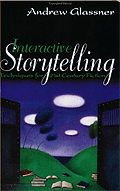
« PREVIOUS ENTRY
Ban Comic Sans
NEXT ENTRY »
The “pro-am revolution”

In video game circles, the big debate these days is about whether video games are driven by narrative or by play-style — narrativology vs. ludology. I think both approaches are useful to understanding games, though I lean towards ludology as more germanely important. While narrative applies to novels, plays, TV, movies, and games, play — working within a set of rules that impose an arbitrary goal and make it tricky to achieve — applies only to games. It is what makes games most game-like.
The other problem with narrative is that it is, at heart, essentially noninteractive. As Northrop Frye argued, the pleasure of a story is masochistic: The fun is in sitting there and going, “yeah? And then? And then? And then?” without ever knowing what’s next. Having any control over that situation changes this dramatically: The masochism is what makes narrative narrative. Take that away, create an interactive situation, and you’ve got something very cool: A game with open-ended, forking scenes, amazingly cinematic visuals, a powerful metaphoric and symbolic system, and other cool stuff. But it’s not a narrative anymore, so studying it as such won’t tell you very much.
My bias here is that I studied literature, so I view the word “narrative” as a precise word — and I think a lot of game theorists use it in an overly imprecise way. They look at a game and see the dramatic scenes, film-like visuals, and metaphoric consistency, and think: Hey, that’s a story! It’s not. And here we come to the point of this blog entry, which is to note an excellent book reviewed at Slashdot today: Interactive Storytelling by Andrew Glassner. As the reviewer notes:
Glassner’s strongly held opinion, which he argues quite coherently, is that a great story is the product of one (or a few) expert storytellers presenting a strong, consistent vision to you, the consumer. The fabled holy grail of gaming is letting the player do whatever they want — full interactivity. And this is to a point fundamentally incompatible with telling a great story. Conflict drives most stories — what if the player quite reasonably minimizes conflict?
Precisely. More interestingly:
… people gravitate toward the entertainment that has the highest fun-to-work ratio. Television is hugely popular since the fun is high to very low, but the work is near zero. They will do more work if it offers a lot more fun. Which means you shouldn’t force your players to do stupid, boring, unnecessary work like running through a dozen screens again and again to get between important locations.
It’s a good question: Why do game-makers so often force you to trek halfway across a virtual world, an incredibly boring task, just so you can get to an important puzzle or battle? Why not just let you teleport to the action? Because they want to show off their genuinely impressive immersive world, of course. Granted, the world really is a lot of fun to explore. But when a game is designed to force you to slog around just to “get through the game”, it is a symptom of the problem of designing games as if they were stories.
A better way of thinking about it might be to treat the immersive world as a piece of architecture. How would you encourage the player to see everything, to admire the elements of design? That’s a project that has nothing to do with story. And indeed, obsessively thinking about the game as a “story” might well get in the way of the true pleasure of the game, which is exploring the world.
Here’s another way of thinking about it: A game can have characters, dramatic sequences, a consistent symbolism, and yet still not be a story. Sure, most games have things that happen one after another. But “one thing happening after another” is not a narrative. Things happen one after another in the The Sims, but those aren’t stories either: They’re simulations, cultural artifacts that are incredibly interesting and engrossing for reasons that have nothing to do with the traditional definition of narrative.
Anyway, I’ll stop now. I salute anyone who’s made it to the end of this incredibly didactic entry.
I'm Clive Thompson, the author of Smarter Than You Think: How Technology is Changing Our Minds for the Better (Penguin Press). You can order the book now at Amazon, Barnes and Noble, Powells, Indiebound, or through your local bookstore! I'm also a contributing writer for the New York Times Magazine and a columnist for Wired magazine. Email is here or ping me via the antiquated form of AOL IM (pomeranian99).

ECHO
Erik Weissengruber
Vespaboy
Terri Senft
Tom Igoe
El Rey Del Art
Morgan Noel
Maura Johnston
Cori Eckert
Heather Gold
Andrew Hearst
Chris Allbritton
Bret Dawson
Michele Tepper
Sharyn November
Gail Jaitin
Barnaby Marshall
Frankly, I'd Rather Not
The Shifted Librarian
Ryan Bigge
Nick Denton
Howard Sherman's Nuggets
Serial Deviant
Ellen McDermott
Jeff Liu
Marc Kelsey
Chris Shieh
Iron Monkey
Diversions
Rob Toole
Donut Rock City
Ross Judson
Idle Words
J-Walk Blog
The Antic Muse
Tribblescape
Little Things
Jeff Heer
Abstract Dynamics
Snark Market
Plastic Bag
Sensory Impact
Incoming Signals
MemeFirst
MemoryCard
Majikthise
Ludonauts
Boing Boing
Slashdot
Atrios
Smart Mobs
Plastic
Ludology.org
The Feature
Gizmodo
game girl
Mindjack
Techdirt Wireless News
Corante Gaming blog
Corante Social Software blog
ECHO
SciTech Daily
Arts and Letters Daily
Textually.org
BlogPulse
Robots.net
Alan Reiter's Wireless Data Weblog
Brad DeLong
Viral Marketing Blog
Gameblogs
Slashdot Games